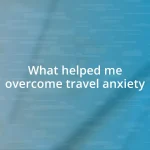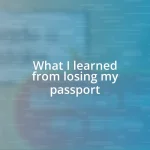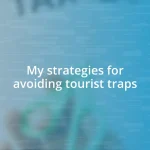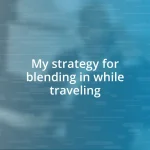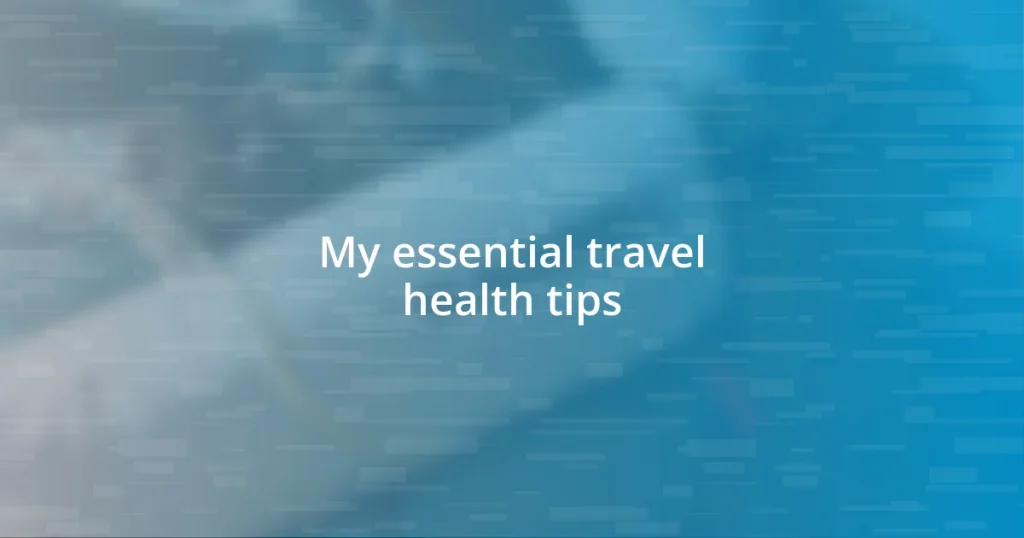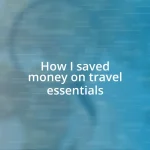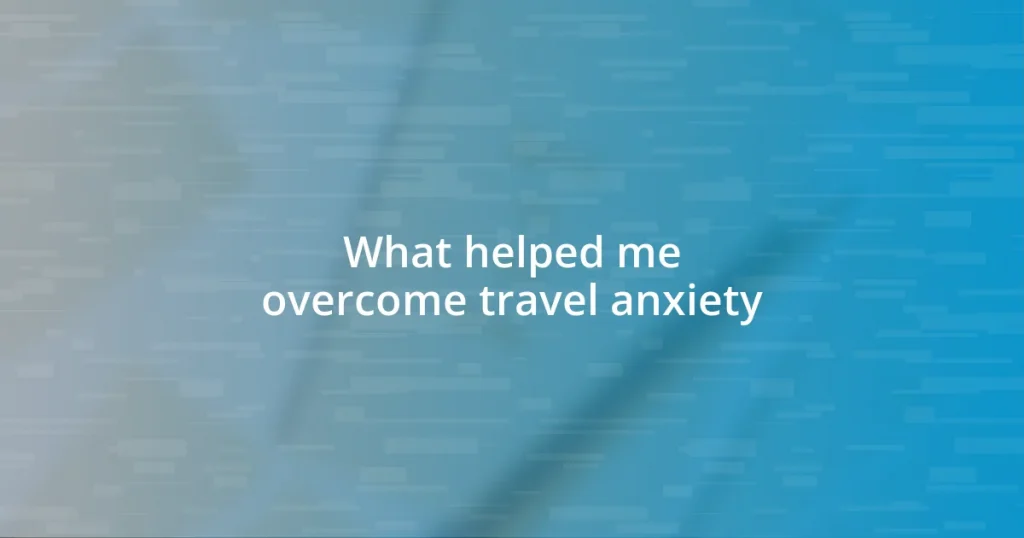Key takeaways:
- Understand health risks and local sanitation practices before traveling; research vaccinations and prepare for waterborne illnesses.
- Pack a travel health kit tailored to your destination, including first aid items, antiseptic wipes, and insect repellent to handle minor health issues effectively.
- Keep a list of emergency contacts, including local services and healthcare options, readily accessible to ensure prompt assistance during travel emergencies.
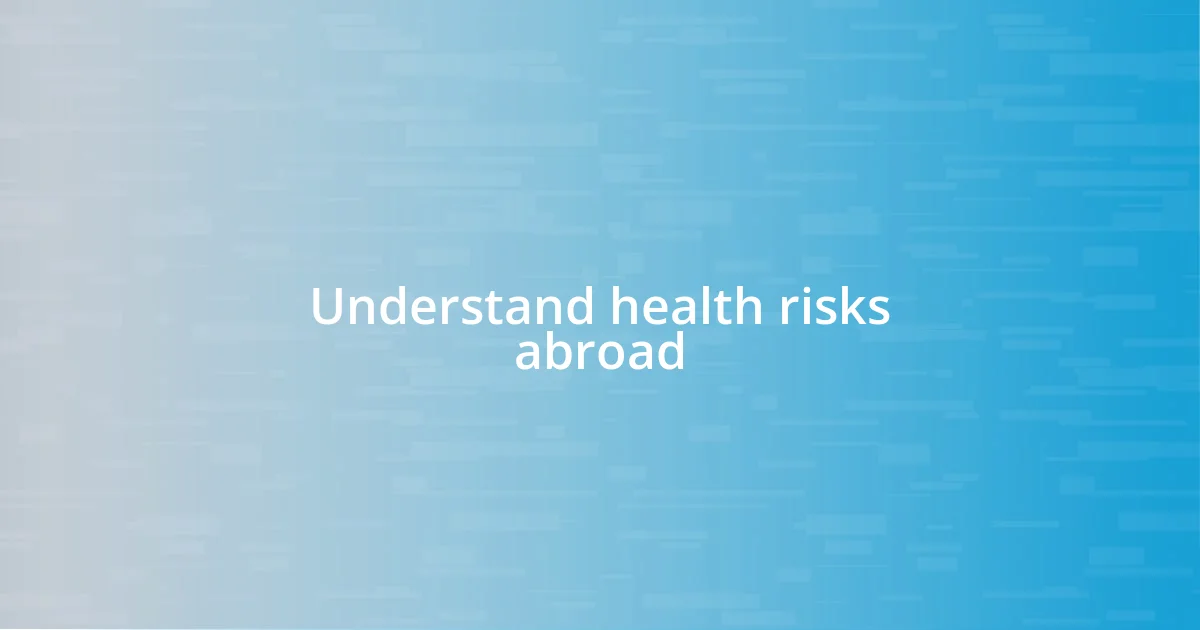
Understand health risks abroad
One of the most crucial steps before traveling is understanding the health risks specific to your destination. I remember planning a trip to Southeast Asia and feeling overwhelmed by the various vaccinations recommended. Was the mild discomfort of a shot really worth it? Absolutely, once I learned about diseases like dengue fever, which could easily sideline a vacation.
In many countries, sanitation practices differ significantly from what we’re used to, making it essential to be aware of waterborne illnesses. I’ll never forget sipping what I thought was safe local water, only to end up with a stomach bug that had me questioning my travel choices. It’s a hard lesson learned, but it reinforced the importance of researching the local health guidelines and packing purification tablets or bottled water instead.
Moreover, don’t overlook the potential for mental health challenges when traveling abroad. When I traveled solo, there were moments of isolation that caught me off guard. How can we prepare for emotional health risks when experiencing new cultures? It’s a reminder to stay connected with loved ones and be mindful of our own emotional well-being while exploring the wonders of the world.

Get travel vaccinations
Getting vaccinated before your trip can feel tedious, but I can’t stress enough how vital it is. On one trip to a remote part of Africa, I made sure to get all the necessary vaccinations, including yellow fever. I watched as others fell ill around me due to a lack of preparation. Those shots were a small price to pay for the peace of mind that came with knowing I was protected.
Here’s a handy list to consider when planning your travel vaccinations:
- Consult a Travel Clinic: Speak with a professional who specializes in travel health.
- Start Early: Some vaccines require multiple doses, so plan ahead.
- Know Your Destination: Certain regions may need specific vaccines, like typhoid or hepatitis A.
- Keep Records: Have a vaccination record handy, especially for destinations that require proof of vaccinations.
- Stay Up-to-Date: Check your routine vaccinations to ensure you’re current on tetanus, measles, and others before you go.
Taking this step can make all the difference in enjoying a trip without health disruptions.
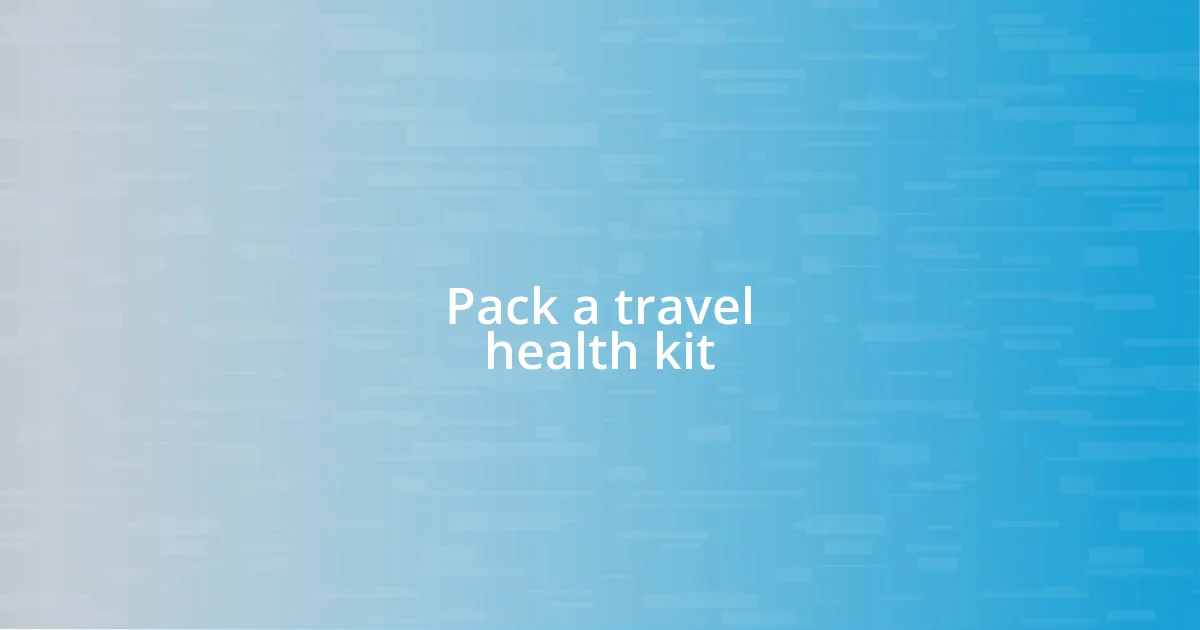
Pack a travel health kit
Packing a travel health kit is often an overlooked aspect of travel planning, but it can save a trip from going awry. I remember my first backpacking trip through Europe, where I threw together a few random items—band-aids, some pain relievers, and sunscreen—but didn’t think further. Fast forward to a minor scrape while hiking; I wished I had more comprehensive supplies. Having a well-stocked health kit can make you feel ready for almost anything.
Your travel health kit should be tailored to the specific needs of your destination and activities. I always pack items like antiseptic wipes, insect repellent, and even a small thermometer. These may seem like small conveniences, but I once found myself on a beach with an itchy rash from an unknown bite. Fortunately, I had my repellent, which eased my concerns and allowed me to enjoy the gorgeous sunset without a worry. You never know what you might encounter, especially if you venture off the beaten path.
To help you build your travel health kit, here’s a comparison table of essential items:
| Essential Item | Purpose |
|---|---|
| First Aid Kit | Treat minor injuries like cuts and scrapes |
| Pain Relievers | Alleviate headaches or muscle aches |
| Antiseptic Wipes | Clean wounds to prevent infection |
| Insect Repellent | Protect against bug bites and diseases |
| Antihistamines | Relieve allergic reactions |
| Prescription Medications | Manage existing health conditions |

Stay hydrated and eat wisely
Staying hydrated while traveling can often be neglected amid the excitement of exploring new places. I recall a trip to the desert where the dry heat sapped my energy quicker than I expected. I learned the hard way that water should be your constant companion. Drinking plenty of fluids not only keeps you alert but helps your body combat fatigue, especially during long sightseeing days. Remember, it’s not just about drinking water—it’s also essential to consume foods rich in water, like fruits and vegetables, to maintain hydration levels.
Eating wisely is another crucial piece of the travel health puzzle. There was a time when I indulged in street food for every meal without considering the impact on my stomach. I vividly remember the food poisoning that followed—a dark cloud over an otherwise amazing trip. Now, I choose meals that balance indulgence with nutrition, incorporating local produce and lean proteins when I can. This approach not only keeps my energy up but also supports my immune system, which can be overwhelmed by travel stress.
Finally, let’s talk about the importance of planning ahead. Do you ever find yourself in a destination where healthy food options seem scarce? On a trek through the mountains, I packed snacks like nuts and dried fruit to have on hand. I learned that being proactive made a significant difference in how I felt throughout the day. By ensuring you have nutritious options readily available, you can enjoy your journey without the worry of unhealthy eating derailing your adventure.

Practice good hygiene habits
Maintaining good hygiene habits while traveling is essential, especially when you’re exposed to new environments. I recall a trip where I underestimated the importance of washing my hands regularly. One moment, I was enjoying a bustling street market, and the next, a bout of food poisoning had me running for the nearest restroom. It was a harsh reminder that taking a few seconds to wash my hands could have saved me from that unpleasant experience.
I’ve also learned that being mindful of hygiene extends beyond just handwashing. While exploring remote locations, I found myself in situations where clean facilities weren’t as accessible. In those moments, I would pack hand sanitizer and disinfectant wipes—it truly turned out to be a lifesaver. I’d use them to clean surfaces before eating or using shared facilities, really adding that extra layer of protection. Have you ever thought about how many hands have touched that train railing before you? It’s a little unsettling, but with a quick wipe, I felt much safer.
Additionally, I make it a habit to avoid touching my face, especially in crowded areas. It’s surprising how often we touch our faces without realizing it, often transferring germs from our hands. Once, during a flight, I noticed another passenger sneezing without covering his mouth. It made me hyper-aware of how easy it is to pick up something nasty. By keeping my hands to myself and using my tissues wisely, I felt empowered rather than vulnerable. Taking these simple yet effective hygiene measures not only protects your health but can also enhance the overall enjoyment of your travels.

Know how to access care
To access health care while traveling, knowing your options is crucial. I remember once exploring a remote village and twisting my ankle. I felt a wave of panic as I realized the nearest hospital was several hours away. Researching local clinics ahead of time, or even downloading a travel health app, can save you from feeling stranded in a moment of need. Have you ever found yourself in a similar situation? Knowing where to turn for help can make all the difference.
Being aware of the local health care systems is equally important. During a trip abroad, I once needed an antibiotic for a sinus infection. I was surprised to find that pharmacies in that country operated differently than I was used to—some didn’t require a prescription for certain medications. This revelation made me appreciate the value of understanding local practices. Trust me, having this knowledge can empower you to seek the right care swiftly instead of fumbling through language barriers or unfamiliar processes.
Lastly, I can’t stress enough the importance of keeping necessary documents handy. On a recent hiking expedition, I fell ill, and having my travel insurance details and any relevant medical info readily available made a stressful situation more manageable. Who wants to dig through bags when you’re feeling unwell? It’s wise to have copies of important documents, like your insurance card and any prescriptions, not just packed but also digitized for easy access. How prepared are you for a health emergency on your next trip? Taking these small steps can ensure that you are well-equipped when the unexpected arises.
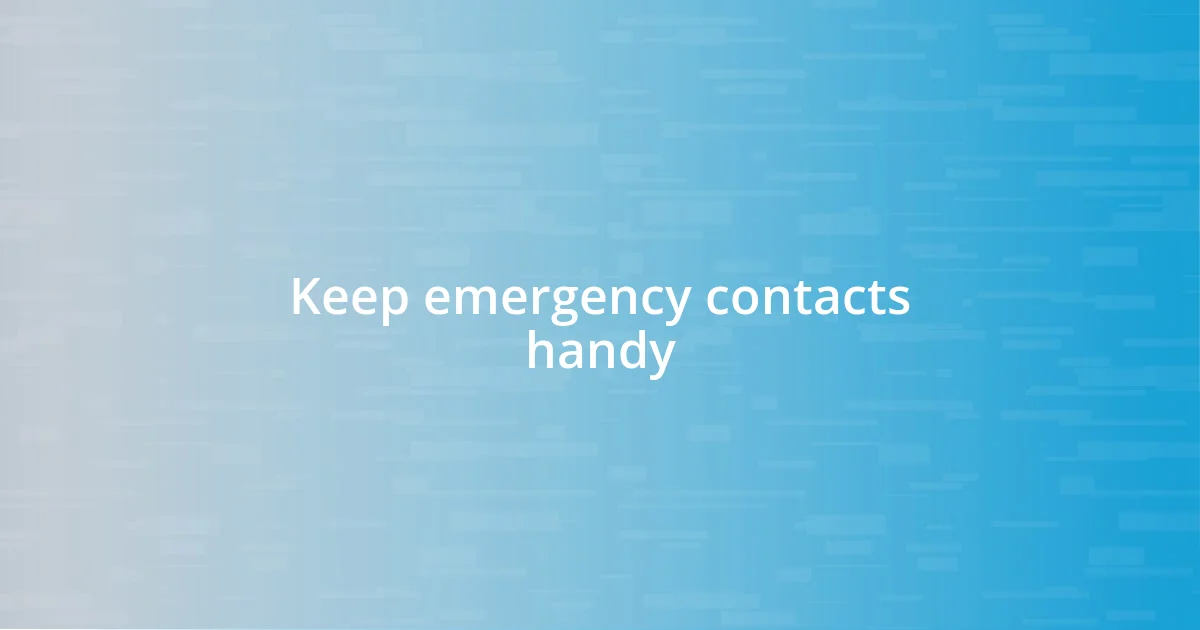
Keep emergency contacts handy
When it comes to keeping emergency contacts handy, I’ve learned the hard way how crucial this can be. I remember one evening while traveling solo in a foreign city, I found myself in a situation where my wallet was stolen. In that moment of panic, I couldn’t recall the number for my accommodation or even the local authorities. Having a list of emergency contacts saved me from feeling completely lost. I’ve since made it a habit to keep a physical copy of important contact numbers tucked away in my bag. Have you thought about who you would reach out to if you experienced a travel emergency?
It’s not just about the numbers of the people you trust. I also make sure to note important contacts for local services, like the nearest hospital or the local embassy. There’s peace of mind that comes from knowing where to turn if things go wrong. One time, I had to rely on my contact list when a friend sprained their ankle during a hike. Knowing who to call for immediate help allowed me to focus on providing first aid rather than scrambling for information.
In addition, I rely on technology to keep my emergency contacts accessible. I save critical numbers in my phone, but I also take screenshots and store them in a dedicated folder for quick access. I’ve even shared my location with a trusted friend when I’m venturing into unknown areas. Have you ever felt vulnerable while traveling alone? Just taking these extra precautions made me feel more secure and supported, and that’s worth its weight in gold when you’re far from home.



